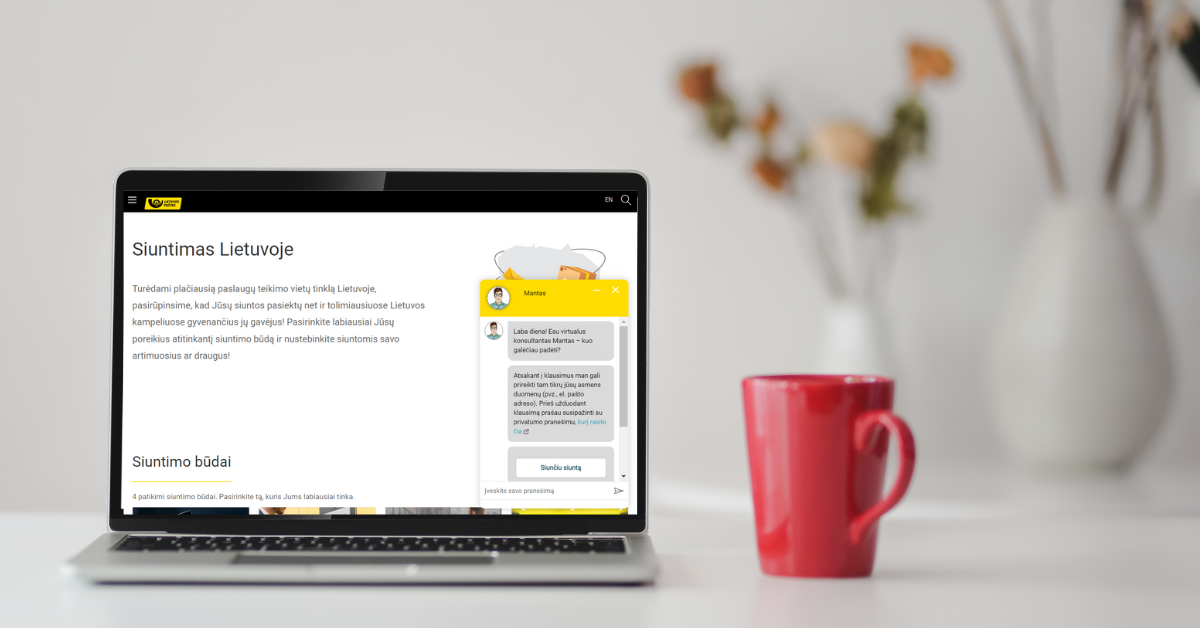
In April, the Lithuanian Post team was joined by Mantas, an intelligent chatbot, which the language technology company Tilde helped Lithuanian Post to develop and implement. According to representatives of Lithuanian Post, the chatbot should take over 50% of written customer requests, and it seems that achieving the goal will not be difficult: Mantas already answers 300 to 500 customer questions per day on average.
„This is not our first project for a company working with parcels, but we develop and adapt the robot individually for each client, as expectations, audiences, and goals vary. Along with the increase in online shopping during the pandemic, there was a natural increase in the use of postal services and people's desire to do everything online, instead of physically. A chatbot is one of the solutions that can be helpful in such situations: people are no longer afraid to submit requests to chatbots, and they significantly speed up the process and improve the customer service experience“, – comments Renata Špukienė, head of the language technology company Tilde IT.
Fears were not confirmed
According to Deimantė Žebrauskaitė, Head of Communications of Lithuanian Post, the company has used chatbot technology before: for some time, customers were assisted on the website by a virtual assistant created by another supplier.
“Already then, we realised the added value it provides in terms of serving customers and making the work of the team more efficient, so we unanimously decided that we needed such a solution. This time, as one of the main goals for the new chatbot, we set the ability to answer a much wider range of customer questions and to provide more accurate answers, compared to the older version of the chatbot. As a result, the team and I did a lot of homework; we were interested in the experience of other companies and the benefits of the solution”, says D. Žebrauskaitė.
According to her, the main goal of Mantas is to reduce the number of requests that require the involvement of the company's consultants: “True, there were worries: we did not know whether the chatbot would be able to respond to a sufficient percentage of requests and whether another channel for submitting requests was needed in general. We wondered whether the robot would have the opposite result and might in fact increase the number of requests due to customers duplicating them and submitting them through all channels. Now we are seeing that this isn’t happening, and clients are happily using the innovation.”
Installation was simple
The head of the language technology company Tilde IT, Renata Špukienė, says that more and more companies, especially those that provide a large amount of services to individuals, are discovering intelligent chatbots as a solution.
A breakthrough in the field of chatbot use can already be seen this year: the technology is fully functional, and people have learnt to enjoy resolving issues online. What's more, installation of the chatbot is simple and does not require IT competence within the organisation. We take care of all technological tasks.
Renata Špukienė
Head of the language technology company Tilde IT
Her remarks are supported by the Head of Communications of Lithuanian Post, who says that working on the implementation of the robot was easy: “The team at Lithuanian Post was made up of colleagues from the Customer Experience Management Department and the Contact Centre, as well as a communication specialist. Specialists from Tilde provided advice not only on the chatbot installation processes themselves, but also on the content: how to prepare, adapt, and change it to make it more acceptable to customers. Development of this project in conjunction with Tilde showed once again what an important role mutual cooperation plays when trying to create a product or service of quality”.

The chatbot guesses what the client wants
Lithuanian Post's chatbot will communicate with customers on two main topics: receiving and sending parcels. The volume of shipments through the Lithuanian Post and LP EXPRESS network is constantly growing, and it is these topics that make up the largest amount of request traffic for the chatbot.
Of course, in addition to these topics, the chatbot also successfully informs customers about other topics: from how to subscribe to publications to self-service steps. We hope that thanks to Mantas, the number of written inquiries answered by our employees will decrease by 50%; and the chatbot already answers 300 to 500 questions a day.
Deimantės Žebrauskaitė
Head of Communications of Lithuanian Post
Her comments are supplemented by Renata Špukienė, who explains that today's smart chatbots work on the basis of artificial intelligence, which means that they are able to answer freely formulated questions.
“Lithuanian Post set a very clear goal: accurate and individual responses.” In order to achieve good results, the chatbot must understand questions presented in free form, written in various styles, with grammatical or punctuation errors. Mantas is able to do this, because he not only reads the question, but he also predicts the intention of the questioner”, comments R. Špukienė.
The project is on-going
According to the CEO of Tilde IT, the speech technology company that created the robot, the myth that robots are dumb still persists. “What's important to understand here is that a robot is only as smart as a human makes it. A chatbot needs constant training in order to be able to answer questions properly. This Lithuanian Post project is on-going; it is and will be developed and improved all the time, because there is a constant need for corrections, and finally – the amount of services provided changes and expands, so it is important to update and put new information on Mantas’ lips immediately”, comments R. Špukienė.
To do this, the team working with the robot is trained, and if necessary, the Tilde IT team is involved, and this helps. According to R. Špukienė, working with a robot is not difficult, because management of the technology is designed for people who are not IT specialists, so no specific knowledge is needed.
Book a demo today to see what Tilde’s AI chatbot can do for your business tomorrow.